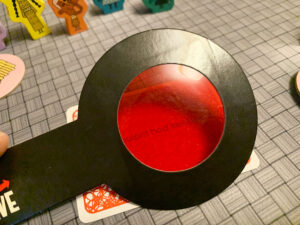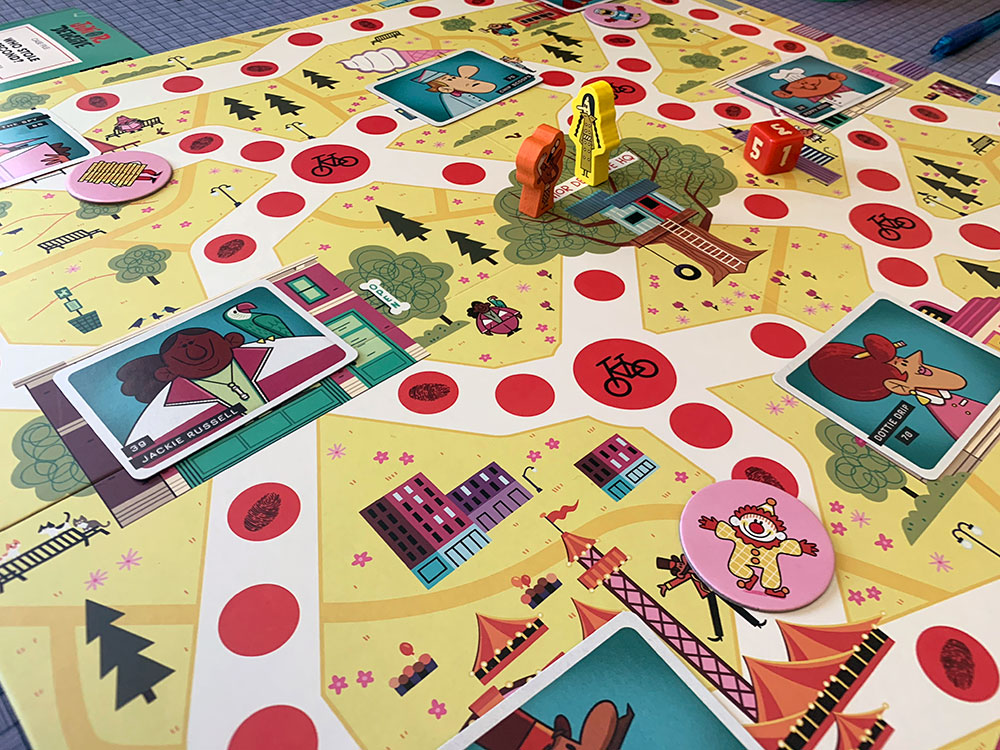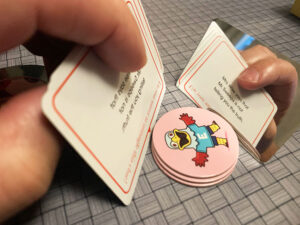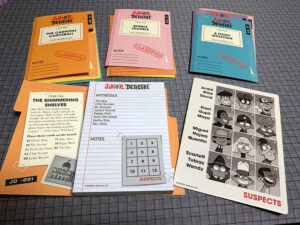 I love the concept of a family-friendly mystery where we can work together to solve a case. But what if you’re an up and coming detective that needs to prove their mettle to move up and earn some respect in the crime plagued town of Evidenton? In that oddly specific example, Junior Detective is here as a competitive game that has your family competing to be the first person to solve different whodunit mysteries.
I love the concept of a family-friendly mystery where we can work together to solve a case. But what if you’re an up and coming detective that needs to prove their mettle to move up and earn some respect in the crime plagued town of Evidenton? In that oddly specific example, Junior Detective is here as a competitive game that has your family competing to be the first person to solve different whodunit mysteries.
Junior Detective, published by Buffalo Games, comes with 40 different family-friendly cases to solve. Are they unique? Why is there so much crime here?
Gameplay Overview:
The game is basically roll and move but… hey, get back here! Outfoxed is a well-loved game that also utilizes roll and move and that won’t be the last comparison to that game. Anyway, on your turn, you’ll roll a d6 and then move your pawn the number of spaces you rolled with a few exceptions. You can’t move past any of the hiding tokens, which are locations where the suspect may be hiding. And, thankfully, you can stop short of your full movement if you pass one of the witness locations.

If you land on a spot marked with the fingerprint you draw a sleuth card which could be good, bad, or useless to you or one or more other detectives. I’ll go into those a bit more in the Game Experience section. If your turn ends on a bike icon you can move to any other space or location on the board.
When you land on one of the eight witness locations you look at their card and use either a red revealer magnifying glass (1X magnification is still a magnification, right?), a mirror to reverse the backwards writing of Mrs. Wise (she’s probably a Leonardo De Vinci stan), and one where you warm the card up to reveal the clue. Each player will want to keep this information a secret from the other detectives and should mark down the information on your detective notepad. Each player also has a board of suspects that they can compare their notes to find the who of the whodunit you’re trying to solve.
Continue to roll and move until you gather enough clues where you can go to the correct hiding place of the suspect and reveal them Scooby Doo style by lining up the solve card with the case file. If you get it right, you win. If you get it wrong, you’re out of the game and then have to watch while the remaining players continue rolling and solving (the deduction game equivalent to Rhymin’ and stealin’) until someone else gets it right.

Game Experience:
Junior Detective is basically Guess Who with an Outfoxed-like mystery theme and moving around a map. Outfoxed is a cooperative version of Guess Who with the theme of being hat-wearing chicken detectives searching for a pie-stealing fox. Previously, my way of turning it into a murder mystery was to say it was a chicken pot pie. But still, regardless of the pie filling, games of Outfoxed always played out the same way. Does Junior Detective have more variety?
Not really. While each case is different and has cleverly different witness cards to point to a different culprit each game plays out fairly similarly where you need to visit the Spy to learn the location and Mrs. Wise to see if any suspects are lying. In several games, I really felt like winning and losing came down to who rolled better and was able to get to the witnesses faster as much as anything skill-related.

Additionally, being able to isolate the suspect without visiting witnesses who don’t know anything can also be the difference between winning and losing. Lastly, writing down or remembering the information is critical. My informal shorthand (read: atrocious handwriting) led me to missing that Mrs. Wise reversed one of the clues and I falsely accused the wrong person of replacing sugar with salt at the coffee shop. But while the prankster escaped my grasp the real monsters are the residents of Evidenton who add more sugar to hot cocoa.
The magnifying glass and mirror were fun to play with and added to the overall experience. The cards that you needed to warm up to read were all quite readable without needing to Mr. Miyagi them to warm them up. However, when I put them in the refrigerator all the letters became the same color, so the card works (it reverted to more easily readable as they warmed to room temperature).

While most of the gameplay plays out similarly each game the sleuth cards do add some variety by forcing you to reveal information, moving hiding locations, yourself, or other detectives. It can be a bit of an eye-roller to get sent back to the place you just left but it’s not as bad as moving the hiding location your opponent is racing towards to an inconvenient location for them. I did that twice to my son as he was going towards a specific hiding location which led him to ask me in a serious tone, “How would you feel if I did that you?” But don’t let that parental mimicry of teaching empathy trick you—he’s savage in take-that games. And for what it’s worth he did win that game—I was just testing the mechanics for review purposes, of course.
Each case is functionally the same but the unique set up of witness cards and placing the solve card over the case file is a clever way to create different scenarios. The arc of each game will be similar, much like Clue, Outfoxed, and many other family games, the largest single factor in determining a winner will be luck.
Final Thoughts:
Ultimately, Junior Detective is for people who want a competitive version of Outfoxed and prefer a light-hearted mystery theme over Dinosaur Tea Party or want to play Guess Who with more than two people. It’s a light and accessible game that comes with a lot of content. I might even go as far as there’s more content than most people will ever play. But while it’s great for families it’s hard to recommend this for hobby gamers who want a meatier experience. I’ll happily play this with my family and recommend it to other families but it’s not going on the after-work board game day list.
Final Score: 3 Stars – Junior Detective is a family-friendly deduction game that will provide plenty of content for children but may not be as satisfying for hobbyists.
 Hits:
Hits:
• Accessible family-friendly deduction game
• Magnifier and mirror are a fun touch
• Generous number of cases included
Misses:
• Luck plays a large part in winning/losing
• The spy cards are readable at room temperature (about 78 degrees F)
• Each case materially plays out the same way
Source: Board Game Quest





